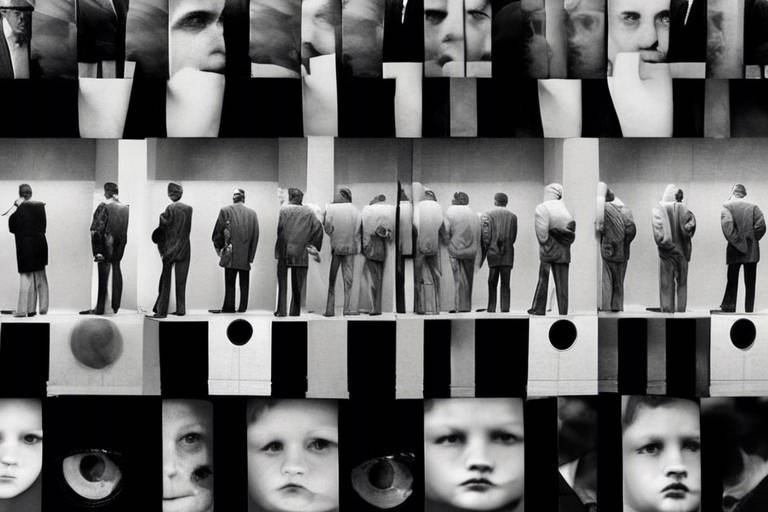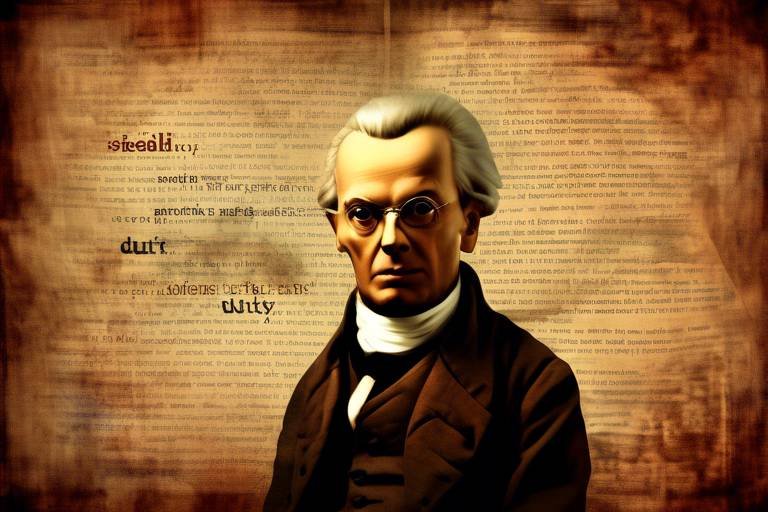Compatibilism and Incompatibilism - A Comparative Analysis
This article explores the philosophical concepts of compatibilism and incompatibilism, examining their definitions, implications, and the ongoing debates surrounding free will and determinism in the context of moral responsibility. The question of whether our actions are determined by prior states of the universe or if we possess genuine free will has puzzled thinkers for centuries. In this analysis, we will delve into both perspectives, shedding light on their nuances and the implications they hold for our understanding of human behavior and ethics.
Compatibilism posits that free will and determinism are compatible. At first glance, this might seem counterintuitive, as one might think that if everything is predetermined, then our choices are mere illusions. However, compatibilists argue that even in a deterministic universe, individuals can still act freely as long as their actions align with their desires and intentions. This section delves into its core principles, historical development, and how it reconciles the notion of free will with a deterministic universe. Compatibilists often emphasize the importance of internal factors, such as beliefs and motivations, in defining free will. For them, free will isn't about the absence of constraints but rather about acting according to one's desires without external coercion.
In stark contrast, incompatibilism argues that free will and determinism cannot coexist. This viewpoint holds that if our actions are predetermined by prior states of the universe, then we cannot be truly free in our decision-making processes. Here, we discuss its foundational beliefs, key philosophers, and the implications for moral accountability in a predetermined world. Incompatibilists assert that for moral responsibility to exist, individuals must have the capacity to choose otherwise, which is fundamentally at odds with a deterministic view of the universe. This creates a fascinating tension in philosophical discourse, as it raises questions about accountability, punishment, and the essence of human agency.
This subsection traces the evolution of compatibilist thought, highlighting influential philosophers like David Hume and Immanuel Kant, and how their ideas shaped contemporary understandings of free will and determinism. Hume's perspective emphasized the importance of human psychology in understanding free will, arguing that our perceptions of choice are rooted in our experiences and emotions. Kant, on the other hand, introduced the idea of moral law, suggesting that true freedom is found in our ability to act according to rational principles, even if those principles are influenced by deterministic factors. This rich philosophical history sets the stage for modern compatibilist arguments.
Exploring the contributions of modern compatibilists, this section focuses on thinkers such as Daniel Dennett and Harry Frankfurt, examining their arguments and defenses of compatibilist views. Dennett's work emphasizes the role of consciousness and decision-making processes, suggesting that understanding how we make choices can illuminate the nature of free will. Frankfurt introduced the concept of "second-order desires," which posits that true freedom involves not just acting on one's desires but also having the capacity to reflect on and endorse those desires. These modern interpretations breathe new life into the compatibilist debate, making it a vibrant area of philosophical inquiry.
Despite its appeal, compatibilism faces criticism. This part outlines common objections raised by incompatibilists and explores the challenges compatibilism encounters in defending its position. Critics argue that compatibilism fails to address the fundamental issue of whether individuals can genuinely choose differently in a deterministic framework. They suggest that if our choices are ultimately determined, then the notion of moral responsibility becomes problematic. This ongoing debate highlights the complexity of the free will discussion and the challenges philosophers face in reconciling these two opposing views.
We examine the development of incompatibilist thought, tracing back to early philosophical debates and the influence of figures like René Descartes and Gottfried Wilhelm Leibniz on the incompatibilist perspective. Descartes famously posited a dualistic view of mind and body, suggesting that the mind operates independently of physical laws, thus allowing for free will. Leibniz, with his notion of pre-established harmony, argued that while the universe is deterministic, human beings possess an innate ability to make choices that are not strictly determined by external factors. These foundational ideas continue to influence contemporary discussions on free will and moral responsibility.
Both compatibilism and incompatibilism have significant implications for moral responsibility. This section investigates how each viewpoint affects our understanding of accountability and ethical behavior in society. If compatibilism holds true, it suggests that individuals can be held morally responsible for their actions, even if those actions are determined. On the other hand, if incompatibilism is correct, it raises profound questions about the nature of punishment and reward, as it implies that individuals may not be truly accountable for their actions in a deterministic framework.
Here, we analyze how compatibilists argue that individuals can be held morally responsible even in a deterministic framework, emphasizing the role of intentions and actions. Compatibilists posit that as long as a person acts according to their desires and intentions, they can be deemed morally responsible for their actions. This perspective allows for a nuanced understanding of moral accountability, accommodating the complexities of human behavior while maintaining a deterministic view of the universe.
This subsection discusses the incompatibilist stance on moral responsibility, arguing that true free will is necessary for accountability, and the consequences of determinism on ethical judgments. Incompatibilists contend that without the ability to choose otherwise, moral responsibility is undermined. This presents a challenging dilemma for society, as it forces us to reconsider how we assign blame and punishment, potentially leading to a more compassionate approach to wrongdoing.
- What is compatibilism? - Compatibilism is the philosophical view that free will and determinism are compatible, allowing for moral responsibility even in a predetermined universe.
- What is incompatibilism? - Incompatibilism argues that free will and determinism cannot coexist, suggesting that true moral responsibility requires the ability to choose freely.
- Can we be held morally responsible in a deterministic world? - Compatibilists believe we can be held morally responsible as long as our actions align with our desires, while incompatibilists argue that true moral responsibility requires genuine free will.

Understanding Compatibilism
Compatibilism is a fascinating philosophical stance that suggests free will and determinism are not mutually exclusive. Imagine a world where the laws of nature dictate the course of events, yet individuals still possess the ability to make choices that reflect their desires and intentions. This perspective invites us to explore how we can be both determined by external factors and still exercise personal agency. Compatibilists argue that free will can exist within a deterministic framework, allowing us to hold individuals accountable for their actions without negating the influence of prior causes.
At its core, compatibilism redefines free will. Rather than viewing it as the absolute freedom to choose otherwise in any circumstance, compatibilists propose that free will is about acting in accordance with one's motivations and desires, even if those desires are shaped by prior events. This interpretation can be likened to a river flowing through a landscape: while the river is guided by the terrain, it still moves and carves its path, representing the choices made along the way. In this analogy, the river's journey embodies the essence of compatibilism, where external influences shape our decisions, but we still navigate our course.
The historical development of compatibilism is rich and varied, tracing back to significant philosophical debates. Early thinkers like David Hume and Immanuel Kant laid the groundwork for compatibilist thought, challenging the notion that determinism negates moral responsibility. Hume, for instance, contended that our understanding of free will should not be tied to the ability to do otherwise but rather to the capacity to act according to our motivations. Kant added depth to this discussion by emphasizing the importance of rationality and autonomy in moral decision-making. Together, these philosophers helped carve out a space for compatibilism in the broader discourse on free will.
In contemporary philosophy, compatibilism has gained traction through the contributions of modern thinkers like Daniel Dennett and Harry Frankfurt. Dennett's work often emphasizes the importance of consciousness and the evolutionary basis of our decision-making processes. He argues that our ability to reflect on our desires and intentions is what truly constitutes free will. On the other hand, Frankfurt introduced the concept of "second-order desires," suggesting that true freedom involves not just acting on our desires but also having the capacity to reflect on and endorse those desires. This nuanced understanding of free will allows compatibilists to navigate the complex relationship between determinism and moral responsibility.
Despite its appeal, compatibilism faces significant critiques. Incompatibilists argue that if our actions are ultimately determined by prior causes, then we cannot be held morally responsible for them. They contend that genuine free will requires the ability to choose differently in identical circumstances, a notion that compatibilism seems to undermine. Critics often raise questions about the authenticity of our choices if they are merely the result of a chain of prior events. This ongoing debate highlights the challenges compatibilism encounters in defending its position and raises important questions about the nature of human agency.
In summary, compatibilism offers a compelling framework for understanding the interplay between free will and determinism. By redefining free will in a way that harmonizes with deterministic principles, it opens up avenues for moral accountability while acknowledging the influences that shape our decisions. As we delve deeper into the implications of compatibilism, we can better appreciate the complexities of human behavior and the philosophical questions that continue to intrigue us.

Understanding Incompatibilism
Incompatibilism is a philosophical stance that asserts the impossibility of free will and determinism coexisting. Imagine a world where every event is predetermined, like a pre-written script; in such a scenario, can we genuinely claim to make choices? This perspective is grounded in the belief that if our actions are determined by prior states of the universe, then our capacity for free will is merely an illusion. Incompatibilists argue that for moral responsibility to exist, individuals must have the ability to choose freely, unencumbered by deterministic forces.
The implications of incompatibilism extend far beyond theoretical discussions. They challenge our perceptions of accountability in everyday life. If we are not truly free to make choices, can we be held responsible for our actions? This question resonates deeply within the realms of ethics and law, prompting us to reconsider how we judge behavior. For instance, if a person commits a crime, an incompatibilist might argue that their actions were predetermined by a myriad of factors—genetics, environment, and past experiences—thus complicating the notion of punishment and moral culpability.
Key figures in the incompatibilist camp include philosophers like René Descartes and Gottfried Wilhelm Leibniz, who laid the groundwork for this line of thought. They posited that true freedom is essential for moral responsibility, and any deterministic view undermines this freedom. Descartes famously stated that the mind is distinct from the deterministic physical world, suggesting a dualistic approach where human agency can exist independently of physical causation. In contrast, Leibniz introduced the idea of pre-established harmony, arguing that while the universe operates under deterministic laws, human choices still reflect a form of freedom that is not bound by these laws.
To further illustrate the incompatibilist viewpoint, consider the following table that contrasts compatibilism and incompatibilism:
| Aspect | Compatibilism | Incompatibilism |
|---|---|---|
| Definition | Free will and determinism can coexist. | Free will and determinism cannot coexist. |
| Moral Responsibility | Individuals can be held responsible even in a deterministic framework. | True moral responsibility requires free will. |
| Key Philosophers | David Hume, Daniel Dennett | René Descartes, Gottfried Wilhelm Leibniz |
| View on Choices | Choices can be free even if determined by prior events. | Choices must be free to be considered genuine. |
Incompatibilism also raises profound questions about the nature of human existence. If we are mere products of cause and effect, then what does it mean to be human? This perspective invites us to consider the intricate dance between fate and freedom, compelling us to reflect on our own lives and the choices we make. Are we simply following a predetermined path, or do we carve our own way through the maze of existence? These questions are not just academic; they shape our understanding of life, ethics, and personal identity.
In conclusion, incompatibilism presents a compelling challenge to the notion of free will in a deterministic universe. It forces us to confront uncomfortable truths about accountability and moral responsibility, pushing the boundaries of our understanding. As we navigate this philosophical landscape, we must grapple with the implications of our beliefs about freedom and determinism, ultimately shaping the way we view ourselves and our actions in the world.
- What is the main argument of incompatibilism? Incompatibilism argues that free will cannot coexist with determinism, meaning that if our actions are predetermined, we cannot be held morally responsible for them.
- Who are some key philosophers associated with incompatibilism? Notable philosophers include René Descartes and Gottfried Wilhelm Leibniz, who contributed significantly to the development of incompatibilist thought.
- How does incompatibilism affect our understanding of moral responsibility? Incompatibilism suggests that true moral responsibility requires free will, leading to complex discussions about accountability in a deterministic world.

The Historical Roots of Compatibilism
To truly grasp the essence of compatibilism, we must journey back through the annals of philosophical thought. This concept didn't just spring up overnight; it evolved through the minds of some of history's greatest thinkers. One of the earliest proponents of ideas that would later be classified as compatibilist was David Hume. Hume argued that human actions, although influenced by prior events and conditions, still possess a form of freedom. He believed that our ability to act according to our desires and intentions allows for a meaningful sense of free will, even within a deterministic framework. This idea laid the groundwork for future compatibilists to build upon.
Fast forward to the 18th century, and we encounter Immanuel Kant, who introduced a nuanced perspective on free will. Kant posited that while the physical world operates under deterministic laws, the realm of morality and human action exists in a different sphere. He argued that for moral responsibility to hold any weight, individuals must possess the capacity to choose freely. This duality of understanding the world—one as a mechanistic system and the other as a moral landscape—further enriched the compatibilist dialogue.
As we move into the modern era, the ideas of compatibilism were further refined by philosophers such as Daniel Dennett. Dennett's work emphasizes the importance of understanding free will not as an absolute freedom from causation but as a nuanced interaction between our desires, intentions, and the deterministic factors that shape our choices. He argues that recognizing our place within a causal framework does not diminish our moral responsibility; rather, it enhances our understanding of what it means to be human.
In examining the historical roots of compatibilism, it’s essential to recognize the ongoing dialogue that has shaped this philosophy. The interplay of ideas between thinkers across centuries has created a rich tapestry of thought that challenges and refines our understanding of free will. Below is a brief table highlighting some key philosophers and their contributions to compatibilism:
| Philosopher | Contribution |
|---|---|
| David Hume | Introduced the idea that free will is compatible with determinism, emphasizing human desires and intentions. |
| Immanuel Kant | Proposed a dualistic approach, distinguishing between the deterministic physical world and the moral realm. |
| Daniel Dennett | Refined compatibilism by arguing that understanding causation enhances, rather than diminishes, moral responsibility. |
Through these historical lenses, we begin to see that compatibilism is not just a philosophical stance; it's a complex interplay of ideas that seeks to reconcile our intuitive sense of free will with the observed realities of a deterministic universe. This ongoing conversation continues to influence contemporary debates about morality, ethics, and human behavior, making it a vital area of inquiry in philosophy today.
- What is compatibilism? Compatibilism is the philosophical view that free will and determinism are compatible, suggesting that individuals can be held morally responsible for their actions even in a deterministic framework.
- Who are some key philosophers associated with compatibilism? Notable philosophers include David Hume, Immanuel Kant, and Daniel Dennett, each contributing unique perspectives to the discussion of free will and determinism.
- How does compatibilism affect moral responsibility? Compatibilists argue that individuals can be held accountable for their actions because they act according to their desires and intentions, even if those desires are influenced by prior events.

Key Philosophers of Compatibilism
When we dive into the rich landscape of compatibilism, we encounter a plethora of thinkers who have shaped and refined the concept over time. One of the most significant figures in this arena is David Hume. Hume, an 18th-century Scottish philosopher, argued that human actions are determined by prior causes, yet he maintained that this does not negate the existence of free will. For Hume, free will is not about the absence of causation but rather about the ability to act according to one's desires and intentions. This perspective laid the groundwork for future compatibilist thought, emphasizing that moral responsibility can coexist with determinism.
Another key philosopher is Immanuel Kant, who, while often considered a complex figure in the realm of free will debates, contributed significantly to compatibilist ideas. Kant proposed a distinction between the phenomenal world, where events are determined by natural laws, and the noumenal world, where individuals possess freedom. This duality allows for a unique understanding of moral responsibility—Kant argued that even in a deterministic universe, individuals can be held accountable for their actions if they act according to rational principles.
Fast forward to modern times, and we find the likes of Daniel Dennett and Harry Frankfurt championing compatibilism with fresh vigor. Dennett, in his book Freedom Evolves, argues that free will is a product of evolutionary processes, suggesting that our ability to make choices is a complex interplay of deterministic factors and emergent properties of consciousness. He posits that understanding free will through the lens of evolution can help reconcile the apparent conflict between determinism and moral responsibility.
On the other hand, Harry Frankfurt introduced the concept of "Frankfurt cases," which are thought experiments designed to challenge the traditional notion of free will. Frankfurt argued that individuals can still be morally responsible even if they could not have acted otherwise. His famous example involves a scenario where a person makes a choice, but an external force ensures that they would have made the same choice regardless. This challenges the incompatibilist view that free will requires the ability to have acted differently, thereby reinforcing the compatibilist stance that moral responsibility can exist within a deterministic framework.
Overall, the contributions of these philosophers highlight a rich dialogue within compatibilism, showcasing how free will can be understood in a deterministic world. Each thinker brings a unique perspective, weaving a complex tapestry of ideas that continue to influence contemporary discussions on morality, responsibility, and human agency.
- What is compatibilism? Compatibilism is the philosophical view that free will and determinism are compatible, suggesting that individuals can be held morally responsible for their actions even if those actions are determined by prior causes.
- Who are the key philosophers associated with compatibilism? Key philosophers include David Hume, Immanuel Kant, Daniel Dennett, and Harry Frankfurt, each contributing unique perspectives to the discussion of free will and determinism.
- How does compatibilism relate to moral responsibility? Compatibilists argue that moral responsibility is maintained in a deterministic framework, as individuals can act according to their desires and intentions, even if those are influenced by prior events.
- What are some criticisms of compatibilism? Critics often argue that compatibilism fails to address the deeper implications of determinism on free will, suggesting that true free will must entail the ability to have acted differently.

Critiques of Compatibilism
While compatibilism offers an appealing synthesis of free will and determinism, it is not without its critics. One of the primary critiques revolves around the notion that compatibilism merely redefines free will in a way that is palatable within a deterministic framework. Critics argue that this redefinition strips free will of its traditional meaning, which implies that individuals have the power to make choices independent of prior causes. This leads to the question: if our choices are merely the result of deterministic processes, can they truly be considered 'free'?
Another significant critique comes from the incompatibilist camp, which contends that compatibilism fails to address the fundamental issue of moral responsibility. Incompatibilists assert that for moral responsibility to exist, individuals must have the ability to choose otherwise—an ability that is inherently denied in a deterministic universe. This raises a critical point: if all our actions are pre-determined, how can we hold anyone accountable for their decisions? This dilemma has led to a deeper philosophical inquiry into the nature of choice and responsibility.
Furthermore, some philosophers, like Peter van Inwagen, argue that compatibilism does not adequately capture the intuitive sense of freedom that most people possess. He posits that true freedom entails the capacity to have acted differently in a given situation. For example, if a person is coerced into making a choice due to external circumstances, many would argue that this person is not acting freely, even if their actions align with compatibilist definitions of free will. This distinction is crucial in understanding why many find compatibilism unsatisfactory.
Additionally, critics highlight the problem of moral luck, which raises questions about how much control we actually have over our actions and their consequences. If external factors significantly influence our decisions, to what extent can we be held responsible for them? This issue complicates the compatibilist narrative, as it suggests that moral accountability might be undermined by the very determinism that compatibilism seeks to reconcile with free will.
In summary, while compatibilism provides a framework for understanding free will within a deterministic universe, it faces substantial critiques. The redefinition of free will, the challenges to moral responsibility, the intuitive sense of freedom, and the implications of moral luck all present significant hurdles for compatibilist theorists. These critiques not only highlight the complexities of the debate but also emphasize the ongoing philosophical struggle to reconcile our understanding of free will with the nature of reality.
- What is compatibilism? Compatibilism is the philosophical view that free will and determinism are compatible, suggesting that individuals can be held morally responsible for their actions even in a deterministic universe.
- What is incompatibilism? Incompatibilism is the belief that free will and determinism cannot coexist, asserting that true moral responsibility requires the ability to have acted differently.
- Who are some key philosophers associated with compatibilism? Some notable compatibilist philosophers include David Hume, Kant, Daniel Dennett, and Harry Frankfurt.
- What are the main critiques of compatibilism? The main critiques include the redefinition of free will, challenges to moral responsibility, the problem of moral luck, and the intuitive sense of freedom that many believe is undermined by determinism.

The Historical Roots of Incompatibilism
Incompatibilism, a philosophical stance asserting that free will and determinism are fundamentally at odds, has a rich historical backdrop that dates back centuries. Its roots can be traced to early philosophical inquiries that sought to understand the nature of human agency and moral responsibility. Thinkers like René Descartes and Gottfried Wilhelm Leibniz were pivotal in shaping the incompatibilist framework, challenging the prevailing notions of free will in the context of a deterministic universe.
Descartes, often hailed as the father of modern philosophy, introduced the idea of dualism—the separation of mind and body. He argued that while the physical world operates under deterministic laws, the mind retains a unique capacity for free will. This perspective laid the groundwork for later incompatibilist thought, positing that true freedom must exist outside the constraints of a determined reality. Descartes’ assertion that the mind could make choices independent of physical causality sparked debates that continue to echo in contemporary discussions.
Similarly, Leibniz contributed to the incompatibilist discourse by advocating for the concept of pre-established harmony. He believed that while the universe operates according to deterministic principles, human actions are still free because they align with a divine plan. This notion suggests that although events are predetermined, individuals possess the autonomy to make choices that resonate with their true selves. Leibniz’s ideas emphasize the complexity of reconciling free will with a deterministic framework, further entrenching the incompatibilist position.
As the centuries progressed, the incompatibilist narrative evolved, influenced by the works of philosophers such as Immanuel Kant. Kant argued that moral responsibility hinges on the existence of free will, asserting that if our actions are predetermined, we cannot be held accountable for them. His categorical imperative—the idea that moral actions should be universally applicable—relies on the assumption that individuals possess the freedom to choose their actions, thus reinforcing the incompatibilist viewpoint.
Throughout the 19th and 20th centuries, the incompatibilist argument gained traction, particularly with the advent of existentialist thinkers like Jean-Paul Sartre. Sartre’s philosophy posited that existence precedes essence, meaning that individuals are not defined by predetermined roles but rather by their choices. This radical notion of freedom challenged the deterministic outlook and emphasized the weight of personal responsibility, further solidifying the incompatibilist stance.
In summary, the historical roots of incompatibilism are deeply embedded in philosophical discourse, characterized by a struggle to reconcile free will with determinism. From Descartes’ dualism to Sartre’s existentialism, these thinkers have shaped the incompatibilist perspective, arguing that genuine moral responsibility requires the existence of free will. The dialogue continues to evolve, inviting new interpretations and debates as we seek to understand the complexities of human agency in a seemingly determined world.
- What is incompatibilism? Incompatibilism is the philosophical view that free will and determinism cannot coexist. If determinism is true, then our choices are predetermined, and we cannot be genuinely free.
- Who are some key philosophers associated with incompatibilism? Notable philosophers include René Descartes, Gottfried Wilhelm Leibniz, Immanuel Kant, and Jean-Paul Sartre, each contributing unique perspectives on the relationship between free will and determinism.
- How does incompatibilism affect moral responsibility? Incompatibilists argue that true moral responsibility requires free will. If our actions are predetermined, we cannot be held accountable for them, raising questions about ethical behavior in a deterministic framework.

The Implications for Moral Responsibility
The debate between compatibilism and incompatibilism significantly shapes our understanding of moral responsibility. At its core, moral responsibility refers to the idea that individuals can be held accountable for their actions, a concept that is intricately tied to the notion of free will. So, how do these two philosophical perspectives influence our views on accountability?
Compatibilism, which argues that free will and determinism can coexist, suggests that individuals are still morally responsible for their actions, even if those actions are predetermined. Compatibilists assert that as long as a person acts according to their own motivations and desires, they can be held accountable. Imagine a puppet on strings: while the strings determine its movements, the puppet still expresses its own unique character through its actions. In this analogy, the strings represent determinism, while the puppet's personality symbolizes free will. This perspective allows for a cohesive framework where society can maintain its moral and legal systems without disruption.
On the flip side, incompatibilism posits that true moral responsibility requires genuine free will. According to incompatibilists, if every action is predetermined by prior causes, individuals cannot be held accountable for their decisions. This perspective raises challenging questions: If a person’s choices are merely the result of a long chain of events beyond their control, can we truly blame them for wrongdoing? This line of thinking can lead to a sense of moral nihilism, where the very foundation of ethics is called into question. For instance, consider a scenario where someone commits a crime due to unavoidable circumstances—should they be punished, or should we empathize with their lack of choice?
To better illustrate these contrasting views, let’s explore a
| Aspect | Compatibilism | Incompatibilism |
|---|---|---|
| Definition of Free Will | Free will exists within a deterministic framework | Free will is incompatible with determinism |
| Moral Accountability | Individuals can be held accountable for their actions | Accountability is undermined if actions are predetermined |
| Legal Implications | Supports the justice system's role in punishment | Challenges traditional notions of punishment |
| Ethical Considerations | Emphasizes intentions and personal agency | Focuses on the absence of true choice |
Both perspectives offer compelling arguments regarding moral responsibility, yet they lead to vastly different conclusions about how we perceive human behavior. The implications extend beyond philosophical discourse; they seep into our legal systems, educational frameworks, and even personal relationships. For instance, if we adopt a compatibilist viewpoint, we might advocate for rehabilitation over punishment, believing that individuals can change and grow. Conversely, an incompatibilist stance could foster a more compassionate approach, urging society to consider the circumstances that shape a person's choices.
Ultimately, the implications of compatibilism and incompatibilism on moral responsibility challenge us to rethink how we assign blame and praise. Are we merely products of our environment, or do we possess the power to shape our destinies? These questions resonate deeply within the fabric of our moral and ethical discussions, inviting us to explore the very essence of what it means to be human.
- What is the main difference between compatibilism and incompatibilism?
Compatibilism asserts that free will and determinism can coexist, while incompatibilism claims that they cannot. - How does compatibilism view moral responsibility?
Compatibilists believe individuals can be held morally responsible even if their actions are determined by prior causes. - What are the ethical implications of incompatibilism?
Incompatibilism raises questions about accountability, suggesting that true free will is necessary for moral responsibility.

Compatibilism and Moral Responsibility
When we dive into the realm of compatibilism, one of the most intriguing aspects that emerge is its relationship with moral responsibility. Compatibilists argue that individuals can indeed be held morally accountable for their actions, even within a deterministic framework. This perspective suggests that our ability to make choices is not negated by the idea that those choices are influenced by prior causes. Instead, compatibilists assert that as long as individuals act according to their desires and intentions, they can be considered morally responsible.
Imagine a well-crafted machine that operates perfectly, responding to inputs in predictable ways. Now, what if we replaced the machine with a person? The compatibilist would argue that, like the machine, individuals operate based on their internal states—desires, beliefs, and motivations. Thus, even if these internal states are shaped by external factors, the individual still possesses the ability to act in accordance with their own motivations. This leads us to an essential question: how can we reconcile our understanding of free will with the implications of determinism?
To further explore this relationship, we can break down the compatibilist view into several key components:
- Intentionality: Compatibilists emphasize the importance of intentions behind actions. If a person acts out of their own desires, they can be held accountable, regardless of whether those desires are determined by prior causes.
- Understanding of Choices: The compatibilist perspective posits that free will is about making choices that align with one’s values and beliefs, even if those values are shaped by past experiences.
- Responsibility and Consequences: Compatibilists argue that moral responsibility is tied to the consequences of actions. If a person can foresee the outcomes of their actions and still chooses to act, they can be held accountable.
Critics of compatibilism often raise concerns about whether true freedom can exist in a deterministic world. They argue that if our actions are predetermined, then the notion of holding someone morally responsible becomes problematic. However, compatibilists counter this by insisting that moral responsibility is not about absolute freedom but about the capacity to act according to one’s motivations and understanding.
In essence, compatibilism offers a unique lens through which we can view moral responsibility. It challenges us to consider the complexities of human behavior and the intricate interplay of freedom and determinism. As we navigate through ethical dilemmas in society, understanding this relationship becomes crucial. After all, if we cannot hold individuals accountable for their actions, what does that mean for our moral frameworks?
- What is compatibilism? Compatibilism is the philosophical view that free will and determinism are compatible, suggesting that individuals can be morally responsible for their actions even if those actions are determined by prior causes.
- How does compatibilism relate to moral responsibility? Compatibilism asserts that as long as individuals act according to their desires and intentions, they can be held morally accountable for their actions, regardless of deterministic influences.
- What are the main critiques of compatibilism? Critics argue that if our actions are predetermined, true freedom is an illusion, which complicates the concept of moral responsibility.

Incompatibilism and Moral Responsibility
Incompatibilism presents a compelling argument regarding moral responsibility, asserting that true free will is a prerequisite for accountability. If our actions are predetermined by prior causes, can we genuinely hold individuals responsible for their choices? This question lies at the heart of the incompatibilist perspective, challenging the very foundation of ethical judgment. Imagine a world where every decision is merely a domino falling in a predetermined line—would it be fair to blame someone for the outcome when they had no real choice in the matter?
Incompatibilists argue that without the ability to choose otherwise, moral responsibility becomes an illusion. For instance, if a person commits a crime due to an uncontrollable impulse or external coercion, the incompatibilist would contend that they should not be held accountable in the same way as someone who acted freely. This view raises important questions about justice systems and how we assign blame. Should we focus on rehabilitation rather than punishment if individuals are not truly responsible for their actions? The implications stretch far beyond philosophical debates, influencing legal frameworks and societal norms.
To further illustrate the incompatibilist stance, consider the following table that outlines key differences between compatibilism and incompatibilism regarding moral responsibility:
| Aspect | Compatibilism | Incompatibilism |
|---|---|---|
| Definition of Free Will | Free will exists within a deterministic framework. | Free will cannot exist if determinism is true. |
| Moral Responsibility | Individuals can be held responsible for their actions. | True responsibility requires the ability to choose otherwise. |
| Implications for Justice | Focus on intentions and actions for accountability. | Emphasis on understanding circumstances and motivations. |
This table highlights the fundamental disagreements between the two perspectives. Incompatibilists often reference the notion of moral luck, which suggests that factors beyond our control can significantly influence the outcomes of our actions. If a person makes a poor decision under duress, should they face the same consequences as someone who acted freely? This line of reasoning leads to a broader discussion about the nature of justice and how society views accountability.
Moreover, incompatibilism can evoke empathy and understanding in our approach to moral failures. If we accept that individuals are often products of their environment and circumstances, we might be more inclined to seek solutions that address the root causes of behavior rather than simply punishing the action itself. This perspective encourages a more compassionate approach to moral responsibility, one that considers the complexities of human behavior.
In conclusion, the incompatibilist view on moral responsibility invites us to reevaluate our understanding of choice, accountability, and justice. By questioning the very nature of free will, incompatibilism challenges us to think deeply about how we assign blame and the implications of our beliefs on societal norms and legal systems. It opens up a dialogue about the importance of context in moral judgments, urging us to consider not just the actions of individuals, but the myriad of factors that contribute to those actions.
- What is incompatibilism? Incompatibilism is the philosophical view that free will and determinism cannot coexist. If determinism is true, then individuals cannot have genuine free will.
- How does incompatibilism affect moral responsibility? Incompatibilists argue that if our actions are predetermined, we cannot be held morally responsible for them, as we lack the ability to choose otherwise.
- What are the implications of incompatibilism for the justice system? The incompatibilist perspective may lead to a focus on rehabilitation rather than punishment, as it emphasizes understanding the underlying causes of behavior rather than simply assigning blame.
Frequently Asked Questions
- What is compatibilism?
Compatibilism is the philosophical view that free will and determinism are not mutually exclusive. It suggests that even if our actions are determined by prior causes, we can still be considered free if we act according to our desires and intentions.
- How does incompatibilism differ from compatibilism?
Incompatibilism asserts that free will and determinism cannot coexist. According to this view, if determinism is true, then individuals cannot be truly free, which raises questions about moral responsibility and accountability.
- Who are some key philosophers associated with compatibilism?
Notable compatibilist philosophers include David Hume, who emphasized the importance of human desires in understanding free will, and contemporary thinkers like Daniel Dennett and Harry Frankfurt, who defend compatibilist views against various critiques.
- What are the implications of compatibilism for moral responsibility?
Compatibilism suggests that individuals can still be held morally responsible for their actions, even in a deterministic framework. This is because moral responsibility hinges on the intentions behind actions rather than the freedom to have acted differently.
- Can you explain the historical roots of incompatibilism?
Incompatibilism has deep historical roots, with early philosophical debates involving figures like René Descartes and Gottfried Wilhelm Leibniz. They laid the groundwork for the idea that true free will requires a break from deterministic constraints.
- What are common criticisms of compatibilism?
Critics argue that compatibilism fails to provide a genuine sense of freedom since it relies on the notion of acting according to one's desires, which may still be determined by prior causes. This leads to questions about the authenticity of moral responsibility.
- Why is the debate between compatibilism and incompatibilism important?
This debate is crucial because it influences our understanding of moral responsibility, ethics, and human behavior. The implications of each viewpoint affect how we hold individuals accountable for their actions in society.



















